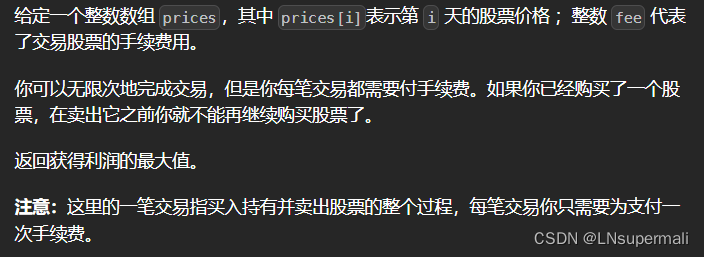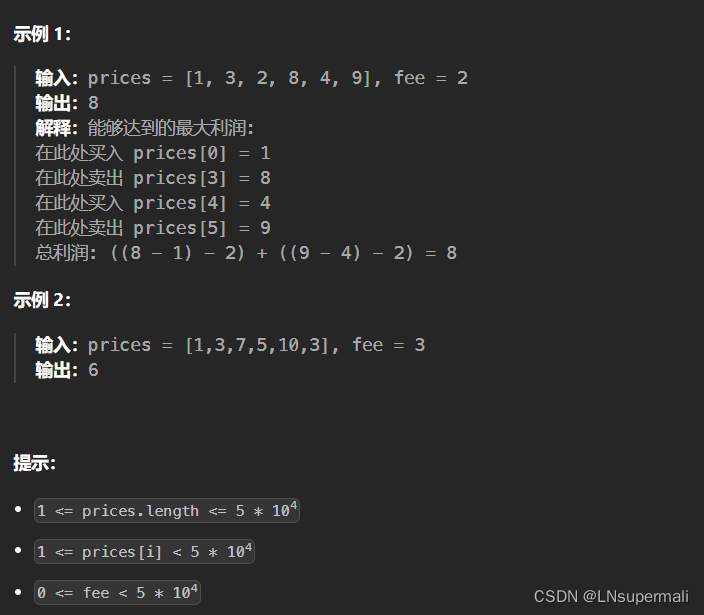力扣714. 买卖股票的最佳时机含手续费(java 动态规划)
Problem: 714. 买卖股票的最佳时机含手续费
题目描述
思路
1.构建多阶段决策模型:n天对应n个阶段,每个阶段决策:买股票、卖股票、不操作;买股票只有当前不持有股票才行,卖股票只有当前持有股票才行,不操作无规则。
2.定义状态:每天有两种状态:持有股票、不持有股票。int dp[n][2]记录每个阶段的状态,dp[i][0]表示第i天持有股票可以获得的最大利润,dp[i][1]表示第i天不持有股票可以获得的最大利润。
3.定义状态转移方程:dp[i][0] = Math.max(dp[i - 1][0], dp[i - 1][1] - prices[i]);即表示若当前持有股票则取出前一天持有股票的最大利润和不持有股票最大利润但减去当前的股票值二者中的最大值。其中dp[i - 1][1] - prices[i]就是表示:由于当前是持有股票,所有假设上一步不持有股票则当前的利润是要在上一步不持有股票最大利润的基础上减去当前购入股票(prices[i])花费的价格,dp[i][1] = Math.max(dp[i][1], dp[i][0] + prices[i] - fee);即表示若当前不持有股票,则取出上一步不持有股票可以获得的最大利润和上一步持有股票再加上当前股票值(prices[i])减去fee得到的利润二者中的最大值。其中dp[i][0] + prices[i] - fee是表示由于当前是不持有股票所以在上一步持有股票可以获得最大利润的基础上再去减去当前股票价格和交易费,则表示当前不再持有股票
解题方法
1.获取数组prices的长度n并申请一个int类型的二维数组(int[][] dp = new int[n][2])其中dp[i][0],与dp[i][1]表示的意义同上述思路;
2.初始化dp[0][0]为-prices[0],表示最开始买入一个股票需要花费;dp[0][1]为0,表示最开始不持有股票可获得最大利润为0;
3.从第一个位置开始完成动态转移方程;
4.返回max(dp[n - 1][0], dp[n - 1][1]);
复杂度
时间复杂度:
O ( n ) O(n) O(n)其中 n n n表示prices数组的大小
空间复杂度:
O ( n ) O(n) O(n)
Code
class Solution {
/**
* Dynamic programming
*
* @param prices The price of stock
* @param fee Handling charge
* @return int
*/
public int maxProfit(int[] prices, int fee) {
int n = prices.length;
//Recode the maximum profit
int[][] dp = new int[n][2];
//dp[i][0] represents the maximum profit
// that can be made from holding the stock
dp[0][0] = -prices[0];
//dp[i][1] represents the maximum profit
// that can be made by not holding the stock
dp[0][1] = 0;
for (int i = 1; i < n; ++i) {
dp[i][0] = Math.max(dp[i - 1][0], dp[i - 1][1] - prices[i]);
dp[i][1] = Math.max(dp[i - 1][1], dp[i - 1][0] + prices[i] - fee);
}
return Math.max(dp[n - 1][0], dp[n - 1][1]);
}
}
本文来自互联网用户投稿,该文观点仅代表作者本人,不代表本站立场。本站仅提供信息存储空间服务,不拥有所有权,不承担相关法律责任。 如若内容造成侵权/违法违规/事实不符,请联系我的编程经验分享网邮箱:chenni525@qq.com进行投诉反馈,一经查实,立即删除!
- Python教程
- 深入理解 MySQL 中的 HAVING 关键字和聚合函数
- Qt之QChar编码(1)
- MyBatis入门基础篇
- 用Python脚本实现FFmpeg批量转换
- 【OSG案例详细分析与讲解】之十四:【立方体贴图】
- Android hwcomposer服务启动流程
- git设置代理
- 贝锐蒲公英解决方案:企业海外分部高效、稳定访问国内办公系统
- springboot 拦截器 interceptorRegistration excludePathPatterns的url该怎么写?
- 目前企业为什么需要大文件传输软件
- 基于Java在线考试管理系统设计与实现(源码+部署文档)
- maven:在maven中使用tomcat7插件
- 【Spring实战】28 @Autowired 和 @Resource注解的区别与使用
- rdma_get_src_port()/rdma_get_dst_port() 获取的port是什么的port

